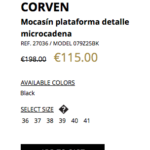Problema con instalación de la extensión AW Blog de Magento
Publicado el 21 septiembre,2016Indice
Hasta hace unos días no habíamos tenido ningún problema al instalar la extensión Aw Blog de Magento. AW Blog es una extensión gratuita de aheadWorks que incorpora un blog dentro de la plataforma Magento.
Error AW blog de Magento al Instalarlo.
Pero hace unos días, instalamos Aw Blog en uno de nuestros proyectos Magento sin ningún percance durante su instalación pero con la consecuente sorpresa de que al ir a insertar un nuevo post, nos aparece una pantalla de error (teniendo en cuenta que tenemos la visión de errores de Magento activada, ya que si no la tenemos activa lo que nos hubiera mostrado es una pantalla en blanco).
El error que nos imprime por pantalla es del tipo:
SQLSTATE[42S02]: Base table or view not found: 1146 Table ‘<user_app>.aw_blog_store’ doesn’t
Error base de datos del Blog de Magento.
El problema es que no se han creado correctamente las bases de datos necesarias para que el módulo funcione. Para solucionar esto, hemos de acceder a phpmyadmin y crear las tablas mediante estas sentencias sql:
— Table structure for table `aw_blog`
—
CREATE TABLE IF NOT EXISTS `aw_blog` (
`post_id` int(11) unsigned NOT NULL AUTO_INCREMENT,
`title` varchar(255) NOT NULL DEFAULT ”,
`post_content` text NOT NULL,
`status` smallint(6) NOT NULL DEFAULT ‘0’,
`created_time` datetime DEFAULT NULL,
`update_time` datetime DEFAULT NULL,
`identifier` varchar(255) NOT NULL DEFAULT ”,
`user` varchar(255) NOT NULL DEFAULT ”,
`update_user` varchar(255) NOT NULL DEFAULT ”,
`meta_keywords` text NOT NULL,
`meta_description` text NOT NULL,
`comments` tinyint(11) NOT NULL,
`tags` text NOT NULL,
`short_content` text NOT NULL,
PRIMARY KEY (`post_id`),
UNIQUE KEY `identifier` (`identifier`)
) ENGINE=InnoDB DEFAULT CHARSET=utf8 AUTO_INCREMENT=2 ;
—
— Dumping data for table `aw_blog`
—
INSERT INTO `aw_blog` (`post_id`, `title`, `post_content`, `status`, `created_time`, `update_time`, `identifier`, `user`, `update_user`, `meta_keywords`, `meta_description`, `comments`, `tags`, `short_content`) VALUES
(1, ‘Hello World’, ‘Welcome to Magento Blog by aheadWorks Co. This is your first post. Edit or delete it, then start blogging!’, 1, ‘2010-09-06 07:28:34’, ‘2012-03-09 10:56:42’, ‘Hello’, ‘Joe Blogs’, ‘Joe Blogs’, ‘Keywords’, ‘Description’, 0, ”, ”);
— ——————————————————–
—
— Table structure for table `aw_blog_cat`
—
CREATE TABLE IF NOT EXISTS `aw_blog_cat` (
`cat_id` int(11) unsigned NOT NULL AUTO_INCREMENT,
`title` varchar(255) NOT NULL DEFAULT ”,
`identifier` varchar(255) NOT NULL DEFAULT ”,
`sort_order` tinyint(6) NOT NULL,
`meta_keywords` text NOT NULL,
`meta_description` text NOT NULL,
PRIMARY KEY (`cat_id`)
) ENGINE=InnoDB DEFAULT CHARSET=utf8 AUTO_INCREMENT=2 ;
—
— Dumping data for table `aw_blog_cat`
—
INSERT INTO `aw_blog_cat` (`cat_id`, `title`, `identifier`, `sort_order`, `meta_keywords`, `meta_description`) VALUES
(1, ‘News’, ‘news’, 0, ”, ”);
— ——————————————————–
—
— Table structure for table `aw_blog_cat_store`
—
CREATE TABLE IF NOT EXISTS `aw_blog_cat_store` (
`cat_id` smallint(6) unsigned DEFAULT NULL,
`store_id` smallint(6) unsigned DEFAULT NULL
) ENGINE=InnoDB DEFAULT CHARSET=utf8;
— ——————————————————–
—
— Table structure for table `aw_blog_comment`
—
CREATE TABLE IF NOT EXISTS `aw_blog_comment` (
`comment_id` int(11) unsigned NOT NULL AUTO_INCREMENT,
`post_id` smallint(11) NOT NULL DEFAULT ‘0’,
`comment` text NOT NULL,
`status` smallint(6) NOT NULL DEFAULT ‘0’,
`created_time` datetime DEFAULT NULL,
`user` varchar(255) NOT NULL DEFAULT ”,
`email` varchar(255) NOT NULL DEFAULT ”,
PRIMARY KEY (`comment_id`)
) ENGINE=InnoDB DEFAULT CHARSET=utf8 AUTO_INCREMENT=2 ;
—
— Dumping data for table `aw_blog_comment`
—
INSERT INTO `aw_blog_comment` (`comment_id`, `post_id`, `comment`, `status`, `created_time`, `user`, `email`) VALUES
(1, 1, ‘This is the first comment. It can be edited, deleted or set to unapproved so it is not displayed. This can be done in the admin panel.’, 2, ‘2012-03-09 10:56:42’, ‘Joe Blogs’, ‘joe@blogs.com’);
— ——————————————————–
—
— Table structure for table `aw_blog_post_cat`
—
CREATE TABLE IF NOT EXISTS `aw_blog_post_cat` (
`cat_id` smallint(6) unsigned DEFAULT NULL,
`post_id` smallint(6) unsigned DEFAULT NULL
) ENGINE=InnoDB DEFAULT CHARSET=utf8;
— ——————————————————–
—
— Table structure for table `aw_blog_store`
—
CREATE TABLE IF NOT EXISTS `aw_blog_store` (
`post_id` smallint(6) unsigned DEFAULT NULL,
`store_id` smallint(6) unsigned DEFAULT NULL
) ENGINE=InnoDB DEFAULT CHARSET=utf8;
— ——————————————————–
—
— Table structure for table `aw_blog_tags`
—
CREATE TABLE IF NOT EXISTS `aw_blog_tags` (
`id` int(11) NOT NULL AUTO_INCREMENT,
`tag` varchar(255) NOT NULL,
`tag_count` int(11) NOT NULL DEFAULT ‘0’,
`store_id` tinyint(4) NOT NULL,
PRIMARY KEY (`id`),
KEY `tag` (`tag`,`tag_count`,`store_id`)
) ENGINE=InnoDB DEFAULT CHARSET=utf8 AUTO_INCREMENT=1 ;
Nota: recomendamos instalar los módulos / extensiones de Magento mediante la subida de los archivos al servidor, descartando la vía Magento Connect. ¿Cómo descargar los archivos de un módulo / extensión de Magento?






Acepto la Política de privacidad